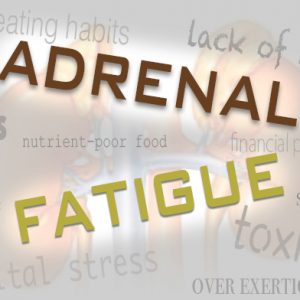What is Adrenal Fatigue
 What is Adrenal Fatigue?
What is Adrenal Fatigue?
Perched gently on top of your kidneys are your adrenal glands! These amazing little organs produce adrenal hormones that help to regulate your bodily functions and to respond to stress. If you are constantly under stress, your adrenal glands work “over-time” and can become depleted.
People with adrenal fatigue experience a level of fatigue that is not relieved by a night’s sleep. Attempts to stay alert with caffeine, sugar and other stimulants work temporarily, but more and more of these products are needed, and eventually do not help. It becomes harder and harder to get out of bed in the morning.
Your adrenal glands release hormones on a daily basis in a rhythmic pattern to maintain your blood sugar levels, to assist your metabolic function and to keep you energized. Some of the hormones that the adrenal glands produce are cortisol, epinephrine (adrenaline) and norepinephrine, all which orchestrate a “fight and flight” response when something stressful comes knocking at your door. Your adrenal glands are very responsive via their direct wiring to your nervous system, and will respond instantly to stress. A good reaction should a lion be coming at you! But if you constantly stay in this “fight and flight” mode your adrenal glands become – you guessed it – fatigued!
When stress gets too high, your adrenal rhythm gets goofed up. In addition to fatigue, you may experience some of the following symptoms:
- weight gain
- sleep disruption
- mood instability
- hormone imbalances, PMS
- inability to recover from exercise
- frequent illnesses
- brain fog
- dizziness when standing up
- feel much better when stressors are gone, i.e. on vacation
- “tired but wired” i.e. can’t fall asleep at night.
Many people are affected by this condition, but conventional medicine does not often recognize the patterns. A saliva test will help determine your amounts of adrenal hormones and assist a trained practitioner to diagnose and determine the severity of adrenal fatigue. Once your patterns have been disrupted, a number of procedures will help you regain normal function.
Renovate Your Diet
One of the first places you want to start is your diet. You want to have a protein-packed breakfast within 30-60 minutes of waking up. This helps stabilize your blood sugar first thing in the morning and sets you up for the day. Keeping your blood sugar balanced takes the stress off your adrenals from having to produce cortisol.
The next step is to continue with consistent meals throughout the day to avoid a drop in blood sugar (hypoglycemia). Ensure all your meals have a good serving of protein. Protein keeps your blood sugar balanced for a longer period of time, avoiding spikes and crashes from sugars and refined carbs.
Adding these dietary routines takes stress off your adrenals throughout the day and allows them to recover in a stable blood sugar environment.
Revamp Your Exercise Regiment
Your exercise routine could be one of the reasons you are experiencing adrenal fatigue; therefore, it has a major impact on your recovery. You could be working out too hard and/or too long and stressing out your body. If you are no longer thriving from your workouts and are finding you need more time to recover, then it’s time for a change.
You want to have a routine number of days you exercise per week. Try Monday, Wednesday and Friday. This allows for a day of rest in between and weekends off for recovery. In more advanced stages of adrenal fatigue, less will accomplish more.
What time of day is best for you to exercise? If you are tired in the mornings, it’s not the best time for you to work out. Find the time of day you have the most energy and get your workouts in at that time. Do not try to push your body when it is tired; your cortisol could be low, and this will put even more stress on your adrenals.
Restore Your Sleep Patterns
The next place you want to focus is on a routine sleep pattern. You will want to get to sleep at the same time every night, and wake up at the same time each morning. This will be the first step in getting your cortisol rhythm to return back to normal. Try to get to bed before 10:00pm each night and even earlier if you are really tired.
Be sure ALL electronics are turned off by 8:00pm. Remove any electronic devices from near your bed and place them at least 10 feet away to reduce EMF (electromagnetic field) emissions, which can disrupt your sleep. Avoid any adrenal stimulation before bed – this means no caffeine after 3pm, no sugary desserts after dinner, no alcoholic night caps, no crazy movies!
Putting these routines into practice will help your adrenal glands function optimally and give you energy and enthusiasm for your daily activities!
[cws_button type=default size=mini link=http://www.wholeness.com/blog ]Back to Blog Home[/cws_button]

Leave a Reply